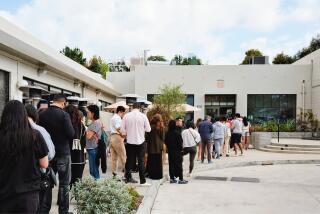Doughnuts to Dollars : Bakers’ dozens: Higher prices for plumper products are basics of Warren J. Foster’s competitive strategy.
- Share via
Within a few blocks of the headquarters of Foster’s Family Donuts in Simi Valley sits one of the doughnut chain’s stores. So does the local Winchell’s Donut House. So does the local Donut Inn.
It’s like that in most Southern California cities, where one can hardly find a strip center devoid of doughnuts. And therein lies the competitive struggle that Warren J. Foster, the founder and president of Foster’s Family Donuts, and his franchisees must try to overcome.
Foster has won his share of battles, though. Since its founding in 1970, Foster’s has become one of the larger independent chains in the area. It now owns 15 stores and franchises another 40 outlets from San Diego to Sacramento and in Idaho. Together they generate between $15 million and $18 million a year in sales, said Foster, who owns the company with his wife, Patricia.
The secret? Foster, a Winchell’s alumnus, asserts that his doughnuts are bigger than his competitors’ and that he doesn’t wage price wars, leaving Foster’s doughnuts often 50% to 85% more costly than his rivals’. The higher prices help keep profit margins fatter--he won’t discuss just how fat--without alienating too many customers and keep Foster’s franchisees happy.
A recent spot check of a few Foster’s outlets in the San Fernando Valley confirmed that its doughnuts are larger than similar selections at Winchell’s. But Foster’s pricing tactics aren’t uniform throughout his franchises. An assorted dozen doughnuts cost $2.99 at a Foster’s in Chatsworth, just pennies below the $3.19 charged by a nearby Winchell’s. Another Foster’s in Canoga Park charged $4.30 for a dozen.
In any case, Foster treats his competitors as equals, saying no one chain gives him more trouble than another.
That bravado seems to be common in the doughnut business, which is led in Southern California by the 580-store Winchell’s, a unit of Canada’s Shato Holdings Ltd. Indeed, Foster’s gets the same ho-hum reaction from its rivals, bigger doughnuts or not.
“There’s no real distinction between them and the other independents,” said Arthur Pfefferman, chairman of Donut Inn, a 40-store chain based in Woodland Hills. “They don’t have any significant marketing or market share per se.”
Robert Galastro, who three months ago was named the president of struggling Winchell’s, also lumped Foster’s with the rest of the crowd. “Anybody who puts out a quality product is competition,” Galastro said.
Regardless, Foster has more expansion planned. He wants to add stores in Sacramento and San Diego, and to set up shop in small communities in Nevada and Montana. “They’re the type of towns we look for,” because they usually have just one or two mom-and-pop doughnut stores, he said.
Foster, 58, runs his enterprise from a modest, one-room office in the middle of his company’s warehouse, where it stockpiles flour, mixes and other supplies sold to its franchisees. Helping out are six of Foster’s nine children and one son-in-law. Foster and his wife, who have lived in Simi Valley since 1963, also have 13 grandchildren and have housed about 30 foster children at various times over the past two decades.
A stocky, tanned Colorado native with razor-straight gray hair and matching mustache, Foster--whose likeness appears on his stores’ doughnut boxes--said he spends most of his time on the road visiting franchisees and trouble-shooting their problems.
Franchisees pay an initial $25,000 fee to get a Foster’s shop, but it costs close to $100,000 to get a store up and running. Franchisees then pay 5.5% of their gross sales to Foster’s in royalties, and an additional 2% to a fund that pays for the chain’s advertising and promotions.
Foster declined to give the average per-store sales or discuss profits. But if the chain’s total sales are $18 million, that works out to $327,270 in average per-store sales. Lop off the 5.5% for Foster, and multiply times 40 (the number of franchisees) and Foster would collect roughly $655,000 a year in royalties.
The franchisees get 30 days or more of training and help in picking out a location. Foster said he looks for people who are “self-motivating, being able to handle money, being able to work with employees and having pride in what they do.”
Foster first learned the doughnut business while working 14 years at Winchell’s, where he rose to the executive vice president at its supplies division and had a seat on its board of directors. But he quit in 1969 when Denny’s Inc. bought Winchell’s, deciding “I could do better.”
He opened his first two stores in Ventura, emphasizing “better service, a tastier product,” Foster said. He also kept making doughnuts through the day to counter the way “Winchell’s schooled a lot of our customers into the idea that you bake at night and you don’t bake any more.”
Foster said he also avoided price wars. “Whatever Winchell’s did, everyone followed suit,” he said. “We never did. We stood off by ourselves, maintained our prices and had very loyal customers.”
Winchell’s Galastro declined to comment specifically on Foster’s pricing claims, but said, “You always are aware of what the competition is doing.” And it appears that despite Foster’s pricing strategy, some of his franchisees do what they please when it comes to prices.
Perhaps that’s because of the mushrooming number of competitors. “We’ll go in next door to the competition; we don’t like to, but we have,” Foster said. “You can’t run and hide your head. You’ve got to believe in what you’re doing.”
More to Read
Inside the business of entertainment
The Wide Shot brings you news, analysis and insights on everything from streaming wars to production — and what it all means for the future.
You may occasionally receive promotional content from the Los Angeles Times.











